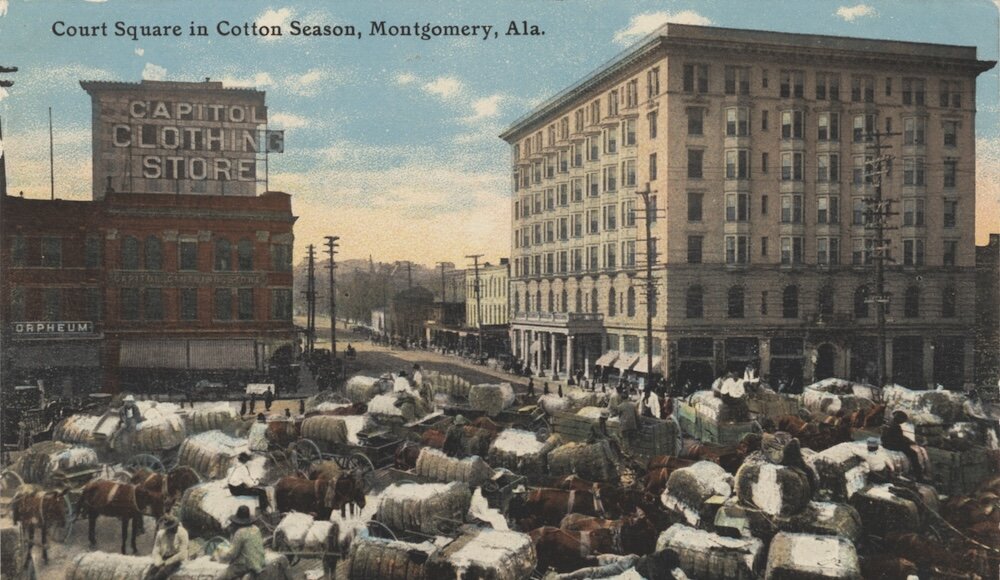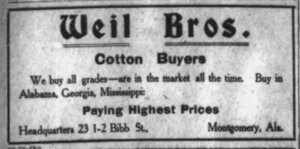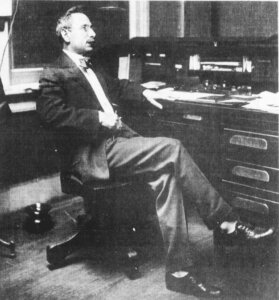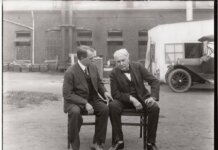
Among the immigrant stories that fill Alabama’s business history, none may be as meteoric as that of the Weil brothers. In 1869, when young Isidor and Herman Weil left Bavaria for America, neither of the lads spoke English. Less than a decade later, they launched a cotton brokerage that, over subsequent generations, grew into one of the world’s largest.
Shopkeeper Abraham Weil had American dreams for his children. In the years after the Civil War, he arranged for most of his sons to make the journey to the New World. Isidor, not yet 13 years of age, and his younger brother, Herman, arrived in 1869, with instructions to make their way to Huntsville where their uncles Isha and Hermann, younger brothers of their father, had a mercantile business. After a few years in Huntsville, Isidor and Herman Weil relocated to the east Alabama town of Opelika to aid another uncle, Moses Lemle, in his mercantile business. Isidor’s knack for the work allowed Lemle to gradually retreat from the business. He eventually retired to Ohio.
Mercantile businesses thrive on credit, particularly from farmers who need to purchase goods in the planting and growing seasons when funds can be scarce. In late-19th-century Alabama where the Weils plied their trade, cotton was not only king; it was currency. After a harvest, many of their agrarian clients would pay them in cotton. It then fell to Isidor to sell that cotton at market. So great was this portion of their business, that, in 1878, Isidor and Herman started their own cotton brokerage.
Weil Bros. Cotton soon expanded into other markets, with small offices in nearby Columbus, Georgia, and in Alabama towns including Selma, Dothan, Eufaula, Mobile and Decatur. Just two years into its operation, the company quickly made the jump into the overseas market, securing its first foreign customer at a cotton mill in northern Italy.
Herman Weil departed for New Orleans after a decade. He was replaced in the Opelika business by Emil, another of Abraham Weil’s America-bound sons. Emil managed the mercantile store and kept the books while Isidor Weil built the brokerage business, buying small loads of cotton nearby and warehouses full of the fleecy staple throughout the country.

George S. Bush, who wrote a 1982 history of Weil Bros., described Isidor in this way: “In today’s lingo, he’d be pigeonholed as a workaholic; except for his family and friends, nothing mattered to him but making the business grow. His sole avocations were the study of history and the reading of the classics. All else struck him as a nuisance.”
The brokerage soon began to feel constrained in Opelika. In 1890, Weil Bros. worked with other surrounding firms to launch the Opelika Compress Co. to generate more market-ready cotton bales and to entice the Central of Georgia Railroad to stop long enough in the east Alabama town to load them. Soon, the compress was handling up to 70,000 bales. The railroad later bought it outright. By the turn of the century, however, Weil Bros. was a six-figure business that Opelika could not hold. Ahead of the 1903 harvest season, the company moved to Montgomery. The relocation put them closer to a larger market of the highly desirable “canebrake cotton,” and a regional railroad hub. But the move also put the growing Weil family closer to other members of the Jewish faith.
They established offices in a multi-story building on Bibb Street. From there, the company bought thousands of bales of cotton, some in smaller batches from farmers crowding Montgomery’s Court Square, and even more from larger-scale producers, purchasing entire harvests at once and arranging transport directly from the farm to a warehouse. In one 1906 transaction, for instance, Weil purchased 3,000 bales from an Andalusia man for $200,000 (roughly $7.1 million today).

Isidor Weil became a fixture of Montgomery’s business life. He sat on the board of directors of two banks, and he gave freely of his own wealth for the benefit of others. During World War I, while both of his sons were serving in the military, he ran the Capital City’s Liberty Loan drives, to which he contributed generously out of his own purse. Of the $75,000 raised by May 1919, $13,000 came from him. A few years later, he spearheaded the state’s Jewish War Relief campaign. “Can you imagine your immediate family torn asunder,” he wrote in an intensely personal appeal, “scattered in all directions, seeking to get together again, to unite under a family shelter and home?” The effort raised nearly $100,000. A third of that sum came from Montgomery.
Although he never officially retired, Isidor Weil’s role in the company he founded changed once his sons returned from the war. As new generations of his family carried the company to new heights, the patriarch occupied himself with philanthropy and his study of history, though his failing eyesight made the latter more challenging. He still played an important role as a company advisor. One of his grandsons recalled that he often would pull him aside at gatherings. “Lookahere,” he would say. “Don’t take any foolish chances.” In a way, those words of advice were at the core of Weil Bros. When the firm announced its closure in 2008, after 130 years in business, the multi-million-dollar company operated in more than two dozen countries and was one of the largest in the world.
Isidor Weil died in 1946 at the age of 89. Three decades later, he was posthumously inducted into the Alabama Business Hall of Fame, as part of a 1981 class that included James Comer, Robert Jemison Jr. and A. G. Gaston. These words ushered him into the hall of fame: “He had seen the fruits of his labor passed on to his children and to his children’s children, and he must have understood, as perhaps only an immigrant can, what it is to attain his own version of the American Dream.”
Historian Scotty E. Kirkland is a freelance contributor to Business Alabama. He lives in Wetumpka.
This article appears in the November 2025 issue of Business Alabama.



